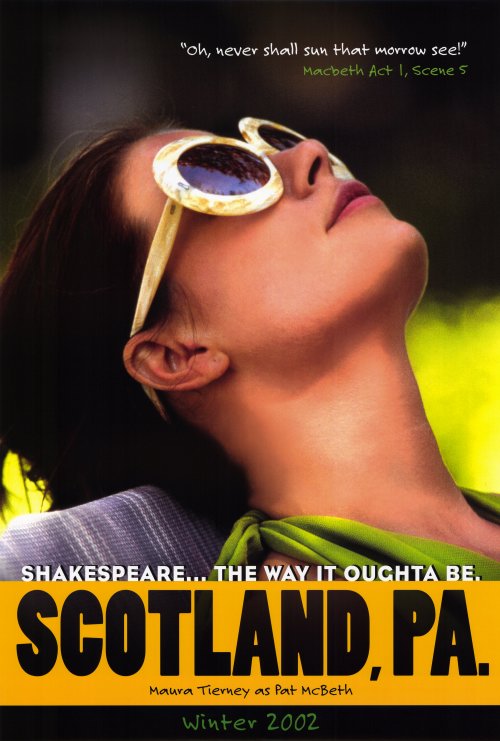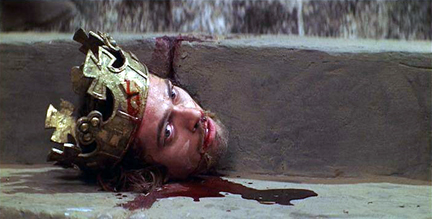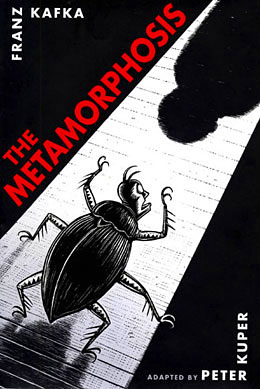
ENG200.002 Introduction to Literary Study
Spring 2011
Mon/Wed 3:00-4:15 pm (Peck Hall 3315)

Figure 1. poster for Billy Morrissette's Scotland, PA (2001)
"Realism is a bad word. In a sense, everything is realistic. I see no line between the imaginary and the real." (Frederico Fellini)
"Thoughts are real," he said. "Words are real. Everything human is real, and sometimes we know things before they happen, even if we aren't aware of it. We live in the present, but the future is inside us at every moment. Maybe that's what writing is about, Sid. Not recording events from the past, but making things happen in the future." (Paul Auster, Oracle Night)
"One of my all-time favorite jazz pianists is Thelonious Monk. Once, when someone asked him how he managed to get a certain special sound out of the piano, Monk pointed to the keyboard and said: 'It can’t be any new note. When you look at the keyboard, all the notes are there already. But if you mean a note enough, it will sound different. You got to pick the notes you really mean!' I often recall these words when I am writing, and I think to myself, 'It’s true. There aren’t any new words. Our job is to give new meanings and special overtones to absolutely ordinary words.' I find the thought reassuring. It means that vast, unknown stretches still lie before us, fertile territories just waiting for us to cultivate them." (Haruki Murakami)
COURSE DESCRIPTION
The stated purpose of English 200 is to introduce undergraduate students to the scholarly study of literature. In order to enhance your ability to truly appreciate and understand literature, to comprehend its multiple levels of reality and unreality, to be able to analyze and discuss it with the proper critical vocabulary, and to really derive enjoyment from it, we will be concentrating upon deepening your knowledge of the artistic techniques and forms that writers employ in their work and of the intellectual strategies that literary critics use to interpret and discuss literary works. This is a course that requires curiosity and demands intellectual rigor, yet also aims to help students be at play in the fields of literature.
This course will also constitute an engagement with what Guy Davenport, in his essay "On Reading," calls "imaginative reading"--"For the real use of imaginative reading is precisely to suspend one's mind in the workings of another sensibility, quite literally to give oneself over to Henry James or Conrad or Ausonius, to Yuri Oleysha, Basho, and Plutarch." In order to read in this manner, one must be willing to lose oneself in the words and worlds and minds that literature creates, and this requires empathy and openness--the willingness to allow oneself to be generally pushed around by the cadences of new languages and the strangers of fictional countries. We must also take the time to read literary works with care and thoughtfulness; we must engage their ideas energetically and with conviction in discussion with others; and we must seek to understand these works on the multiple levels of imagery and meaning they body forth. You will learn that one does not think well in a vacuum--our ideas benefit immeasurably when exchanged with others in a series of critical dialogues. Preparing for and participating in class are therefore vitally important to your success in this class.
Special Note: As this is also a reading-intensive course, not keeping up with the reading could be extremely detrimental to your progress and final evaluation. One final (but important) word: coming to class without the text under discussion will be automatic grounds for dismissal from that particular class period (and will count as an absence).

Figure 2. still image from Roman Polanski's Macbeth (1972)
REQUIRED RENTAL TEXTS (available at SIUE Textbook Service)
Textbook Rental Services>
Alison Booth et alia, eds. The Norton Introduction to Literature. 10th ed. W.W. Norton, 2010.
Paul Auster. Oracle Night. Picador, 2004.
Rita Dove. Thomas and Beulah: Poems. Carnegie-Mellon Press, 1986.
Gabriel Garcia Marquez. Collected Stories. Harper Perennial Modern Classics, 1999.

Figure 3. cover of Peter Kuper's 2004 comic-book adaptation of Kafka's The Metamorphosis
COURSE REQUIREMENTS
SHORT PAPERS (12% each = 60%)
There will be 5 short papers (posted on the "Schedule of Events" below) that are designed to help you hone basic and practical reading, explication, and analytical skills. For some of these papers, you will write responses to one or more prompts related to the readings under discussion. Other papers will be designed to help you practice specific skills of literary criticism, such as explicating poetry and outlining the structure of a narrative. Your writing in these papers will be mainly interpretive in nature and will be graded on the requisite effort (or lack thereof) put forth, and not on whether or not your ideas are "right" or "wrong." In this class, there are never any right or wrong answers, only more or less interesting ones. Please note that these papers make up over half of your final grade.
CRITICAL ESSAY (30%)
Toward the end of the semester, there will be one short critical paper (3-4 pages) in which you will demonstrate your skills at the close analytical reading of one literary text (no secondary research will be necessary or allowed). In this essay, you will practice your hand at literary interpretation, where you produce your own ideas about how a text creates meaning. Through close reading, you will look closely at the language of the text in order to demonstrate not just what you think a text means, but more importantly how it means what you think it does.
PARTICIPATION (10%)
As stated above under "Course Description," participation is vital to your success in this course. That means having a good attendance record, coming to class prepared to discuss the readings (with book or books in hand), and actively contributing to critically engaged conversations with your professor and peers.
LATE ASSIGNMENT POLICY
I do not accept late assignments. Period. If there is an extraordinarily good reason for needing an extension on a due date, let me know in advance, and we will work it out.
ATTENDANCE POLICY
Attendance, promptness, and participation are essential to success in college courses. Faculty members recognize that unexpected occasions may arise when a student must be absent from class, but my general attendance policy is that if you are absent more than the number of required class sessions per week (in this case, that would be more than 2 sessions), I have the option of lowering your final course grade by one letter grade for each additional session missed. Furthermore, if absences become excessive (more than two weeks' worth of sessions), the SIUE Registrar, at my request, reserves the right to withdraw you administratively. For more information on this, please consult the following: SIUE Class Attendance Policy. Failure to attend class in a responsible and committed manner may thus be grounds for failure in or administrative withdrawal from the course.
ACADEMIC DISHONESTY
Any student found engaging in an act of academic dishonesty will be promptly dismissed from the course with a grade of "F." By "academic dishonesty," I mean PLAGIARISM (the act of representing the work of another as one's own), which the University considers a grave breach of intellectual integrity. All definitions, terminology, concepts, and patterns of organization taken from an outside source must be identified and given credit in any essay or exam you write--whether it be for the English department or any other department. For more detailed information on this, please consult the following: SIUE Plagiarism Policy.
DISABILITY ACCOMMODATIONS
If you feel that you are entitled to special accommodations (for example, a volunteer note-taker, interpreter, special desk, or extra time on tests), please contact the Disability Support Services office in Rendleman Hall #1218 (Phillip Pownall, Director), or visit their website, and they will help you fill out the necessary paperwork.

Figure 4 . Nicholas Cage as Charlie Kaufman in Adaptation (2002)
SCHEDULE OF EVENTS
| Monday | Jan. 10 | Introduction to Course |
| Part I. The Play's the Thing: “The bad end unhappily, the good unluckily. That is what tragedy means.”--Tom Stoppard | ||
| Wednesday | Jan. 12 | READ: |
| Sophocles, Antigone (Norton Intro. to Lit.) | ||
| USEFUL LINKS: | ||
| YouTube: Antigone, Part 4 & Part 7 (1984 television version) | ||
| Basic Definitions: Comedy and Tragedy | ||
| Structure of the Ancient Greek Theater | ||
| The Origins of Western Theater | ||
| Antigone: Background Story | ||
| Antigone: Notes and Discussion | ||
| Monday | Jan. 17 | No Class -- Martin Luther King, Jr. Holiday |
| Wednesday | Jan. 19 | READ: |
| Sophocles, Antigone (Norton Intro. to Lit.) | ||
| Joe Sachs, "Aristotle's Poetics" | ||
| Monday | Jan. 24 | READ: |
| Shakespeare, Macbeth | ||
| Ian Johnston, "Introduction to Macbeth" | ||
| USEFUL LINKS: | ||
| Shakespeare's Globe Theatre | ||
| Steven Mullaney, "Shakespeare and the Liberties" | ||
| Due: Short Paper #1 | ||
| Wednesday | Jan. 26 | READ: |
| Shakespeare, Macbeth | ||
| Ian Johnston, "Dramatic Structure: Comedy and Tragedy" & "Comedy and Tragedy as Visions of Experience" [these are excerpts from a longer introduction to Shakespeare's work by Johnston; scroll down until you see the two sub-titles above and read those 2 sections of the longer essay] | ||
| USEFUL LINK: | ||
| YouTube: excerpt from Roman Polanski's Macbeth (1971) | ||
| Monday | Jan. 31 | No Class -- Inclement Weather |
| Wednesday | Feb. 2 | No Class -- Inclement Weather |
| Monday | Feb. 7 | VIEW: Scotland, PA (film), Part I |
| Wednesday | Feb. 9 | VIEW: Scotland, PA (film), Part II |
| Monday | Feb. 14 | DISCUSS: Macbeth and Scotland, PA |
| Due: Short Paper #2 | ||
| Part II. Fiction: “Fiction was invented the day Jonas arrived home and told his wife that he was three days late because he had been swallowed by a whale.”--Gabriel García Márquez | ||
| Wednesday | Feb. 16 | READ: |
| Lorrie Moore, "How" (Norton Intro. to Lit.) | ||
| Margaret Atwood, "Happy Endings" (Norton Intro. to Lit.) | ||
| Monday | Feb. 21 | READ: |
| Franz Kafka, "The Metamorphosis" (Norton Intro. to Lit.) | ||
| USEFUL LINK: | ||
| YouTube: The Metamorphosis: Part I (short animated adaptation of Kafka's story) | ||
| Wednesday | Feb. 23 | DISCUSS: |
| Franz Kafka, "The Metamorphosis" (Norton Intro. to Lit.) | ||
| Monday | Feb. 28 | READ: |
| Amy Hempel, Tumble Home: A Novella (handout) | ||
| USEFUL LINKS: | ||
| Interview: "Amy Hempel, The Art of Fiction No. 176" (The Paris Review) | ||
| Interview: "Amy Hempel" (Bombsite.com) | ||
| Wednesday | Mar. 2 | DISCUSS: |
| Amy Hempel, Tumble Home: A Novella (handout) | ||
| Due: Short Paper #3 | ||
| Monday-Friday | Mar. 7-11 | No Class -- Spring Break |
| Monday | Mar. 14 | READ: |
| Gabriel García Márquez, Collected Stories, pp. 217-264 | ||
| USEFUL LINKS: | ||
| Magical Realism (definition) | ||
| An Introduction to Magical Realism (another definition) | ||
| Gabriel García Márquez (The Modern World website) | ||
| Margin: Exploring Modern Magical Realism | ||
| Wednesday | Mar. 16 | READ: |
| Gabriel García Márquez, Collected Stories, pp. 265-337 | ||
| Monday | Mar. 21 | DISCUSS: |
| Gabriel García Márquez, Collected Stories | ||
| Wednesday | Mar. 23 | VIEW: Adaptation (film), Part I |
| USEFUL LINKS: | ||
| Being Charlie Kaufman.com | ||
| Film Scripts Archive (Charlie Kaufman) | ||
| Monday | Mar. 28 | VIEW: Adaptation (film), Part II |
| Wednesday | Mar. 30 | DISCUSS: Adaptation (film) |
| Due: Short Paper #4 | ||
| Monday | Apr. 4 | READ: |
| Paul Auster, Oracle Night | ||
| USEFUL LINKS: | ||
| K.M. Payne and George Simmers, "A Maze of Mirrors: An Adventure in Hypertext" | ||
| Ingrid Hoofd, "Aristotle's Poetics: Some Affirmations and Critiques" | ||
| George Landow, "Is Hypertext Fiction possible? (Or does the link privilege poetry?)" | ||
| Wednesday | Apr. 6 | DISCUSS: |
| Paul Auster, Oracle Night | ||
| Part III. Poetry: “If I feel physically as if the top of my head were taken off, I know that is poetry.”--Emily Dickinson | ||
| Monday | Apr. 11 | READ: |
| Sharon Olds, "Leningrad Cemetery, Winter of 1941"; Adrienne Rich, "Diving into the Wreck"; W.H. Auden, "Musée des Beaux Arts" (Norton Intro. to Lit.) | ||
| LISTEN: | ||
| Adrienne Rich, "Diving Into the Wreck" (Poets.org soundfile) | ||
| Sylvia Plath, "Lady Lazarus" (YouTube) | ||
| Billie Holiday, "Strange Fruit" (YouTube) | ||
| Billie Collins, "Litany" (YouTube) | ||
| VIEW: | ||
| Pieter Brughel, Landscape with the Fall of Icarus (c. 1558) | ||
| Wednesday | Apr. 13 | READ: |
| Spencer Reece, "Florida Ghazals" (handout) | ||
| USEFUL LINKS: | ||
| Emerging Poet: On Spencer Reece (Poets.org) | ||
| "A Conversation with Spencer Reece" (Blackbird) | ||
| Poetic Form: Ghazal (Poets.org) | ||
| Ghazal (Wikipedia.org) | ||
| Monday | Apr. 18 | READ: |
| Rita Dove, Thomas and Beulah: I. Mandolin, "The Event" through "The Zeppelin Factory" | ||
| USEFUL LINKS: | ||
| Rita Dove (Poets.org) | ||
| Rita Dove (Poetry Foundation) | ||
| Due: Short Paper #5 | ||
| Wednesday | Apr. 20 | READ: |
| Rita Dove, Thomas and Beulah: I. Mandolin, "Under the Viaduct" through "Thomas at the Wheel" | ||
| Monday | Apr. 25 | READ: |
| Rita Dove, Thomas and Beulah: II. Canary in Bloom, "Taking in Wash" through "Anniversary" | ||
| Wednesday | Apr. 27 | READ: |
| Rita Dove, Thomas and Beulah: II. Canary in Bloom, "The House on Bishop Street" through "The Oriental Ballerina" | ||
| Friday | May 6 (by midnight) | Critical Essay Due (essay must be emailed to me at: eileenajoy@gmail.com as an attached Word document) |